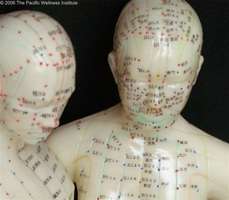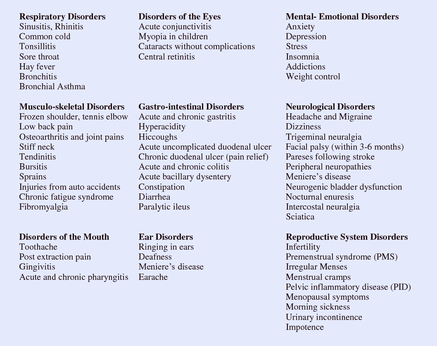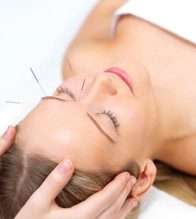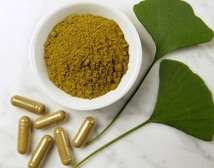FAQ

Q. What is acupuncture?
A. Acupuncture is a form of Chinese Medicine that has been used successfully for over 3,000 years. It involves the insertion of extremely thin needles at strategic acupuncture points along the body. Other treatment modalities in Chinese Medicine include nutrition and herbal therapy, cupping, tuina and guasha.
Q. How does acupuncture work?
A. Chinese medicine as a whole is based on the concept of balance which is often seen symbolized by yin and yang. Acupuncture is based on the theory that we all have a vital energy called Qi, pronounced “chee”. This Qi flows throughout the body along meridians that connect to all of our major organs, much like the nervous system. According to Chinese medical theory, when the Qi is unbalanced or blocked pain or disease develops. Acupuncture encourages natural healing by applying very fine needles to specific points located along these meridians in order to access the Qi, balancing it or unblocking it to restore health. Modern research has proven the efficacy of acupuncture, but more research is needed to further explain just how acupuncture works from a scientific standpoint. So far, researchers have identified that acupuncture triggers a release of chemicals called endorphins that naturally relieve pain and promote feelings of well-being.
Q. What does Acupuncture treat?
A. Acupuncture is very effective for pain relief, but it also used to treat a wide variety of other medical conditions. Based on research, the World Health Organization (WHO) has listed several conditions known to be treatable by acupuncture and Oriental medicine including:
A. Acupuncture is a form of Chinese Medicine that has been used successfully for over 3,000 years. It involves the insertion of extremely thin needles at strategic acupuncture points along the body. Other treatment modalities in Chinese Medicine include nutrition and herbal therapy, cupping, tuina and guasha.
Q. How does acupuncture work?
A. Chinese medicine as a whole is based on the concept of balance which is often seen symbolized by yin and yang. Acupuncture is based on the theory that we all have a vital energy called Qi, pronounced “chee”. This Qi flows throughout the body along meridians that connect to all of our major organs, much like the nervous system. According to Chinese medical theory, when the Qi is unbalanced or blocked pain or disease develops. Acupuncture encourages natural healing by applying very fine needles to specific points located along these meridians in order to access the Qi, balancing it or unblocking it to restore health. Modern research has proven the efficacy of acupuncture, but more research is needed to further explain just how acupuncture works from a scientific standpoint. So far, researchers have identified that acupuncture triggers a release of chemicals called endorphins that naturally relieve pain and promote feelings of well-being.
Q. What does Acupuncture treat?
A. Acupuncture is very effective for pain relief, but it also used to treat a wide variety of other medical conditions. Based on research, the World Health Organization (WHO) has listed several conditions known to be treatable by acupuncture and Oriental medicine including:


Q. Does acupuncture hurt?
A. No. On the contrary, most people find acupuncture to be very relaxing and rejuvenating. If any discomfort is felt upon insertion it passes quickly and is mild. Once the needles are inserted it is common to feel a mild ache, heaviness, warmth or even a burst of energy that can be felt along the meridians. These are all considered positive sensations that signal the arrival of Qi. The reason acupuncture needles don't hurt is because they are extremely thin compared to a hypodermic needle, which is used for injections or drawing blood. You can fit actually fit about 40 acupuncture needles into the tip of one hypodermic needle.
Q. How many treatments will I need?
A. It is not unusual to notice changes immediately after the first treatment. However, the average patient will begin to notice changes within the first 2-5 acupuncture treatments and significant improvements within 6-12 treatments. With acupuncture, the effectiveness of each treatment typically builds upon the previous one. Conditions such as CTS, may require Carpal Tunnel braces for relief and welness. The number of treatments required depends on the nature, severity and length of the health concern as well as the individual response. Acute conditions tend to resolve more quickly with a short intensive series of treatments whereas chronic conditions may require a longer and more consistent series of treatments. Once significant changes have been made, maintenance treatments may or may not be required depending on the patient. This may mean a treatment every one to three months to prevent a relapse of symptoms.
Q. Is acupuncture safe?
A. Yes. Acupuncture is very safe with no side effects. Acupuncturists are trained in exact location, angle and depth of insertion to avoid any injuries. The needles used are extremely thin, sterile and disposable needles. Acupuncturists must be CNT (Clean Needle Technique) certified as required by the NCCAOM.
Q. What are the requirements to become an Acupuncturist?
A. Acupuncturists must graduate from a school that is accredited by either the United States government or by the National Accreditation Commission for Schools and Colleges of Acupuncture and Oriental Medicine (NACSCAOM). An acupuncturist’s education is typically a 5 year program including at least 450 hours of training in Western sciences (anatomy, physiology, microbiology, biochemistry, pathology, western clinical sciences, hygiene and cardio-pulmonary resuscitation) and a minimum of 750 hours of acupuncture study (fundamental principles, diagnosis, pathology, therapeutics, meridians and points, and acupuncture technique including electro-acupuncture). Clinical training must include a minimum of 150 hours of clinical observation and 720 hours of supervised practice. Acupuncturists must have applied over 400 treatments on at least 100 patients over the course of more than one year of their schooling. Board exams are administered by the National Certification Commission of Acupuncture and Oriental Medicine (NCCAOM) in order to obtain licensure.
Q. What are the requirements to become an Acupuncturist?
A. Acupuncturists must graduate from a school that is accredited by either the United States government or by the National Accreditation Commission for Schools and Colleges of Acupuncture and Oriental Medicine (NACSCAOM). An acupuncturist’s education is typically a 5 year program including at least 450 hours of training in Western sciences (anatomy, physiology, microbiology, biochemistry, pathology, western clinical sciences, hygiene and cardio-pulmonary resuscitation) and a minimum of 750 hours of acupuncture study (fundamental principles, diagnosis, pathology, therapeutics, meridians and points, and acupuncture technique including electro-acupuncture). Clinical training must include a minimum of 150 hours of clinical observation and 720 hours of supervised practice. Acupuncturists must have applied over 400 treatments on at least 100 patients over the course of more than one year of their schooling. Board exams are administered by the National Certification Commission of Acupuncture and Oriental Medicine (NCCAOM) in order to obtain licensure.
A. No. On the contrary, most people find acupuncture to be very relaxing and rejuvenating. If any discomfort is felt upon insertion it passes quickly and is mild. Once the needles are inserted it is common to feel a mild ache, heaviness, warmth or even a burst of energy that can be felt along the meridians. These are all considered positive sensations that signal the arrival of Qi. The reason acupuncture needles don't hurt is because they are extremely thin compared to a hypodermic needle, which is used for injections or drawing blood. You can fit actually fit about 40 acupuncture needles into the tip of one hypodermic needle.
Q. How many treatments will I need?
A. It is not unusual to notice changes immediately after the first treatment. However, the average patient will begin to notice changes within the first 2-5 acupuncture treatments and significant improvements within 6-12 treatments. With acupuncture, the effectiveness of each treatment typically builds upon the previous one. Conditions such as CTS, may require Carpal Tunnel braces for relief and welness. The number of treatments required depends on the nature, severity and length of the health concern as well as the individual response. Acute conditions tend to resolve more quickly with a short intensive series of treatments whereas chronic conditions may require a longer and more consistent series of treatments. Once significant changes have been made, maintenance treatments may or may not be required depending on the patient. This may mean a treatment every one to three months to prevent a relapse of symptoms.
Q. Is acupuncture safe?
A. Yes. Acupuncture is very safe with no side effects. Acupuncturists are trained in exact location, angle and depth of insertion to avoid any injuries. The needles used are extremely thin, sterile and disposable needles. Acupuncturists must be CNT (Clean Needle Technique) certified as required by the NCCAOM.
Q. What are the requirements to become an Acupuncturist?
A. Acupuncturists must graduate from a school that is accredited by either the United States government or by the National Accreditation Commission for Schools and Colleges of Acupuncture and Oriental Medicine (NACSCAOM). An acupuncturist’s education is typically a 5 year program including at least 450 hours of training in Western sciences (anatomy, physiology, microbiology, biochemistry, pathology, western clinical sciences, hygiene and cardio-pulmonary resuscitation) and a minimum of 750 hours of acupuncture study (fundamental principles, diagnosis, pathology, therapeutics, meridians and points, and acupuncture technique including electro-acupuncture). Clinical training must include a minimum of 150 hours of clinical observation and 720 hours of supervised practice. Acupuncturists must have applied over 400 treatments on at least 100 patients over the course of more than one year of their schooling. Board exams are administered by the National Certification Commission of Acupuncture and Oriental Medicine (NCCAOM) in order to obtain licensure.
Q. What are the requirements to become an Acupuncturist?
A. Acupuncturists must graduate from a school that is accredited by either the United States government or by the National Accreditation Commission for Schools and Colleges of Acupuncture and Oriental Medicine (NACSCAOM). An acupuncturist’s education is typically a 5 year program including at least 450 hours of training in Western sciences (anatomy, physiology, microbiology, biochemistry, pathology, western clinical sciences, hygiene and cardio-pulmonary resuscitation) and a minimum of 750 hours of acupuncture study (fundamental principles, diagnosis, pathology, therapeutics, meridians and points, and acupuncture technique including electro-acupuncture). Clinical training must include a minimum of 150 hours of clinical observation and 720 hours of supervised practice. Acupuncturists must have applied over 400 treatments on at least 100 patients over the course of more than one year of their schooling. Board exams are administered by the National Certification Commission of Acupuncture and Oriental Medicine (NCCAOM) in order to obtain licensure.

Q. What can I expect during a treatment?
A. During your first consultation, the practitioner will collect a complete history and detailed evaluation of your condition. They will ask questions relating to many different aspects of your life, not only the condition for which you are seeking treatment. The practitioner will then take your pulse, examine your tongue, and sometimes palpate your abdomen or check for tender areas along the meridians. Once the needles are inserted the patient is to relax for approximately 20 minutes. The practitioner may prescribe an herbal formula or administer other forms of therapy such as cupping or guasha.
Q. How can I prepare for my session?
A. It is best to eat a light meal before your appointment so that your body has energy to work with. Sometimes a person who has not eaten for a long period of time will feel lightheaded or weak when receiving an acupuncture treatment. It is best to wear shorts or loose clothing so that the arms and legs below the elbows and knees, as well as the abdomen, are accessible. Do not engage in strenuous activity, drink alcohol, smoke excessively, or ingest heavy meals before or after your treatment. This will allow the body to adjust to the effects of the acupuncture.
Q. Will my insurance cover Acupuncture?
A. There are a growing number of insurance companies which cover acupuncture. Dr. Will is a preferred provider with Blue Cross Blue Shield, Cigna and United and accepts many other insurance plans. To verify your coverage simply call the office at 703-879-5144 with your insurance information and we will verify your coverage for you. If your plan does not cover acupuncture our fees are as follows:
A. During your first consultation, the practitioner will collect a complete history and detailed evaluation of your condition. They will ask questions relating to many different aspects of your life, not only the condition for which you are seeking treatment. The practitioner will then take your pulse, examine your tongue, and sometimes palpate your abdomen or check for tender areas along the meridians. Once the needles are inserted the patient is to relax for approximately 20 minutes. The practitioner may prescribe an herbal formula or administer other forms of therapy such as cupping or guasha.
Q. How can I prepare for my session?
A. It is best to eat a light meal before your appointment so that your body has energy to work with. Sometimes a person who has not eaten for a long period of time will feel lightheaded or weak when receiving an acupuncture treatment. It is best to wear shorts or loose clothing so that the arms and legs below the elbows and knees, as well as the abdomen, are accessible. Do not engage in strenuous activity, drink alcohol, smoke excessively, or ingest heavy meals before or after your treatment. This will allow the body to adjust to the effects of the acupuncture.
Q. Will my insurance cover Acupuncture?
A. There are a growing number of insurance companies which cover acupuncture. Dr. Will is a preferred provider with Blue Cross Blue Shield, Cigna and United and accepts many other insurance plans. To verify your coverage simply call the office at 703-879-5144 with your insurance information and we will verify your coverage for you. If your plan does not cover acupuncture our fees are as follows:
Initial exam & consultation: $55
single session - $95
5 pack - $450
10 pack - $800
15 pack - $1125
Herbal consult only - $75
(each session last appx 1 hour)
single session - $95
5 pack - $450
10 pack - $800
15 pack - $1125
Herbal consult only - $75
(each session last appx 1 hour)
Ashley Will, LAc
Acupuncture & Herbal Healing Center
now located at Skyline Wellness Center
4300 King St, Suite 130
Alexandria, VA 22302
703-879-5144
www.skylinewellnesscenter.com